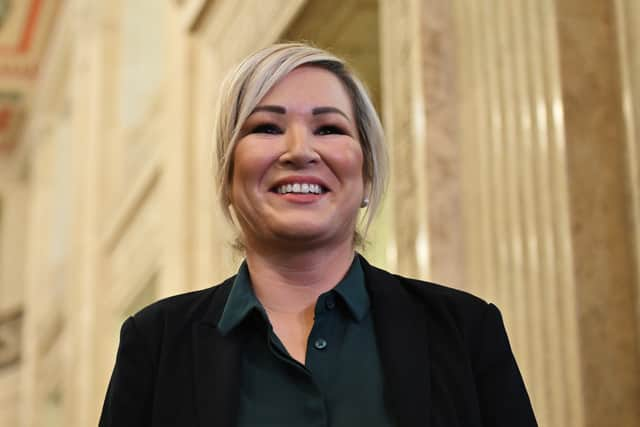Sinn Féin: who is Northern Ireland’s nationalist party leader Michelle O’Neill?
and live on Freeview channel 276
Michelle O'Neill is set to become Northern Ireland's first Sinn Féin First Minister following the DUP agreeing to restore power-sharing at Stormont.
The DUP collapsed the government in February 2022 over concerns with post-Brexit trading plans. Last night (January 30), DUP leader Sir Jeffrey Donaldson said the party would return to the Stormont Executive following an agreement with Westminster.
Advertisement
Hide AdAdvertisement
Hide AdIn the last Northern Ireland elections in 2022, Sinn Féin were named the largest party for the first time, meaning that following the restoration of power they will be responsible for nominating a First Minister.
Under Northern Ireland’s power sharing executive, the two largest parties are required to both nominate a First and Deputy First Minister. Here’s everything you need to know about who Sinn Féin are, who Michelle O'Neill is and what this means for Northern Ireland.
Who are Sinn Féin?
Sinn Féin is an Irish republican political party that won the most seats in Northern Ireland’s most recent assembly elections. The name Sinn Féin means for ourselves, or we ourselves in Irish.
The party has had roots in Irish politics since 1905 - before Ireland was partitioned by the UK. However, it grew in popularity in the 1970s, when it became the political wing of the IRA during the Troubles.
Advertisement
Hide AdAdvertisement
Hide AdSinn Féin is the biggest nationalist party in Northern Ireland, with 27 assembly members in Northern Ireland’s parliament. It also has seven MPs in the House of Commons, but they do not take their seats. They also have a political presence in Ireland, with 36 TDs in the Dáil (Irish Parliament), making them the official opposition party.


Who is Michelle O’Neill?
Michelle O’Neill is the Vice-President of Sinn Féin and the party’s political leader in Northern Ireland. From the village of Clonoe in County Tyrone, she became involved with politics as a teenager after the signing of the Good Friday Agreement in 1998.
O'Neill was first elected in 2005 as a councillor for Dungannon, later becoming the first female mayor. In 2007, she was elected to the Northern Ireland Assembly for the first time to represent Mid Ulster. From 2020, she served as Northern Ireland’s deputy first minister, right up until the Assembly collapsed in February 2022.
Will Michelle O'Neill be the First Minister of Northern Ireland?
Following the results of Northern Ireland's last election in 2022, Sinn Féin is the largest party in Northern Ireland with the most seats in the Stormont Assembly.
Advertisement
Hide AdAdvertisement
Hide AdThis means that Sinn Féin are in the position to nominate the First Minister of Northern Ireland for the first time, with Michelle O'Neill expected to be their candidate.
Under the power sharing agreement for the Northern Ireland Assembly, there must be representatives from the largest Unionist and Nationalist parties. The two largest parties must nominate a first and deputy minister who will work together in the Assembly.
Will there be a border poll?
Sinn Fein’s goal is the unification of Ireland and the party is committed to holding a border poll, calling on the British and Irish governments to set a date for one in their manifesto.
In May 2022, Sinn Féin Party Leader Mary Lou McDonald said that planning for a border referendum needs to begin. McDonald said: “I believe that the referendum would be possible within a five-year timeframe, but much more importantly, I believe the preparation needs to start now”
Advertisement
Hide AdAdvertisement
Hide AdHowever, under the rules for a referendum, outlined in the Good Friday Agreement, a border poll can only be called by the UK government’s secretary of state for Northern Ireland if it appears that the majority of voters want a united Ireland.
Comment Guidelines
National World encourages reader discussion on our stories. User feedback, insights and back-and-forth exchanges add a rich layer of context to reporting. Please review our Community Guidelines before commenting.
